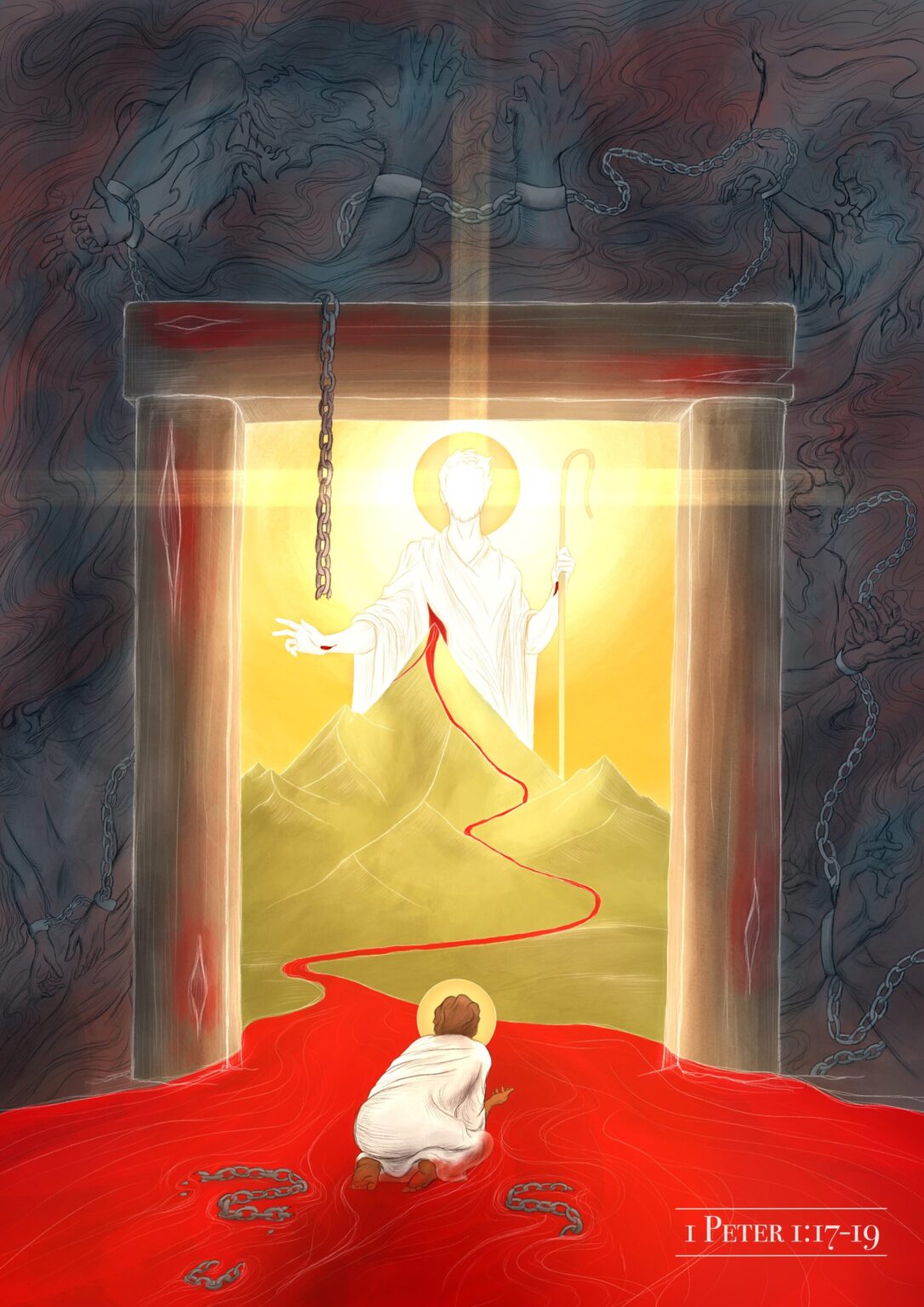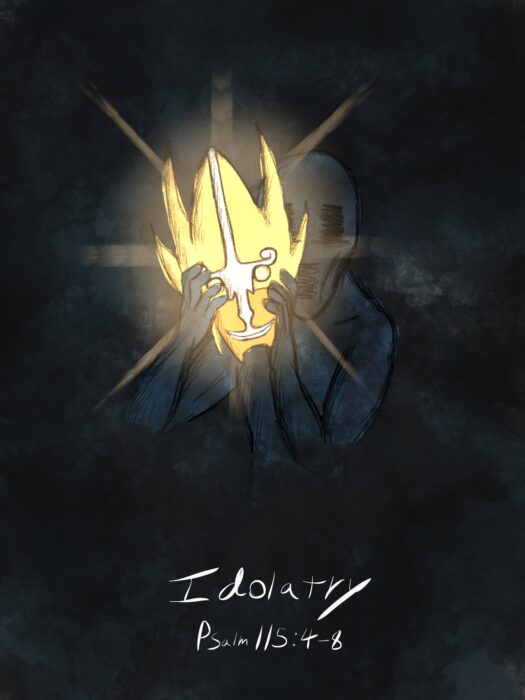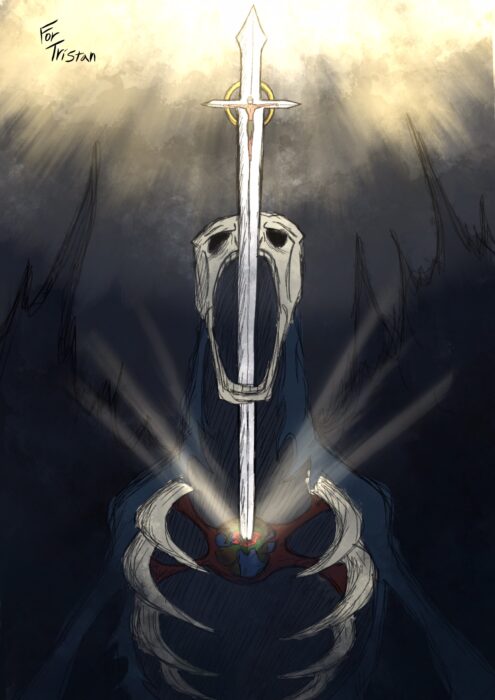
And if you call on him as Father who judges impartially according to each one’s deeds, conduct yourselves with fear throughout the time of your exile, knowing that you were ransomed from the futile ways inherited from your forefathers, not with perishable things such as silver or gold, but with the precious blood of Christ, like that of a lamb without blemish or spot.
1 Peter 1:17-19 (ESV)
The Passage Explained
I based this picture on 1 Peter 1:17-19. In this passage, Peter is calling his readers to live out the sort of holiness that accords with their status as elect exiles saved by grace and guarded by faith for eternal joy in Christ, namely, a life lived in holy fear of the Lord. The fear that Peter is commending here seems to be a fear of trampling on the riches of salvation, a fear of treating as worthless that which is priceless. I say this because of the way he supports his exhortation to fear in verse 18.
Lives of Holy Fear at the Foot of the Cross
Verse 17’s call to “conduct yourselves with fear,” is grounded in in verse 18 by a certain knowledge that Peter assumes his readers have, namely, a knowledge of the staggering magnitude of mercy that has been poured out for the freedom that they now enjoy as children of God. They were once slaves to the “futile ways inherited from [their] forefathers”–that is, slaves to sin because of the deceitful desires that drove them to prefer “not God” to God (2 Peter 1:4, 9-20)–but have now been ransomed from that diabolic slave market at a cost that defies the imagination: the blood of God the Son Himself.
Why does a recognition of the great cost of our ransom lead to a life conducted in holy fear? Perhaps an example will help to illustrate Peter’s point. Imagine that two brothers had been the slaves of a brutal taskmaster all their lives. Then, one night there is a chance of escape and the elder brother gives up his life so that the younger can escape. Now imagine a few weeks later, the younger brother goes back to the slave master and turns himself in. In doing this the younger brother desecrates the memory and worth of his elder’s life and sacrifice. He has treated his brother as though he were worth nothing and enslaved himself again in the process.
It seems that Peter’s logic is working along these lines, albeit on an infinitely higher level. He is calling his readers to marvel afresh at the grace of God that has given them such a salvation so that they might, out of a trembling, awe-struck reverence for the person and work of their Ransoming Lord, hold fast in faith to the one who’s power will keep them faithful until the end (1 Peter 1:5, 21).
Our Ransom
Peter’s combination of “ransom” and “lamb” language in verse 18-19 likely alludes to the practice of redeeming the life of a firstborn son by the sacrifice of a lamb (though, ransom from slavery may be in view as well. Leviticus 25:25, or see especially verses like Deuteronomy 15:15 which link ransom from slavery and the redemptive work of YHWH). In Exodus 13:12-13, we see that any firstborn animal and child had to be either “redeemed” (same word in the Greek OT as “ransomed” here in 1 Peter) or killed. The children were, of course, not killed but mandatorily redeemed through the death of a lamb. The rationale given for this practice in verses 14-16 is that during the Passover YHWH killed all the firstborn of Egypt while the Israelites were spared (because the blood of a lamb was placed on the doorposts of their homes). The implication here is that a child must be redeemed by the death of a lamb because, in some sense, the death of the last plague was averted for them as well. The lamb with which they are redeemed is symbolically bearing the death they deserved, and they are free.
Peter takes this rich Old Covenant imagery and applies it to Christ. God the Son is the true “Passover Lamb,” whose blood has ransomed all of His people and brought them out of slavery into the inheritance of sons. And, as the Passover lamb dies the death deserved by the one who is ransomed, so too Christ ransoms His people by absorbing the eternal death that they deserve–the wrath of God–into Himself on the cross.
The Picture Explained
To represent these concepts in visual form was a challenge.
Our former slavery to sin is represented by the anguished forms bound in chains around the borders of the picture. This is the state into which we were all born by nature. The unsettled lines and slight distortion of the forms points to the chaotic, ever-shifting desires that overcome and bind our hearts to sin (again,1 Peter 1:14a, 2 Peter 1:4a), as well as to the slow dehumanization that takes place as we exchange the glory of God for created things (Romans 1:24-32).
A blood-covered threshold forms the division between the “slave market” and the freedom of Christ. This doorway echoes Passover night and implies that the “death” from which the true Passover lamb has ransomed us is the death of slavery to sin leading to the second death of hell itself–a death that Christ bore in our place on the cross. One chain hangs over the door post and is broken near the wound in Christ’s hand, reinforcing the concept that the blood of Christ our Sacrificial Lamb has ransomed us from the spiritual death of bondage to sin.
The former slave, swathed in a river of ransoming blood, kneels in a posture of worship and awe with his eyes lifted toward the one who has purchased his freedom. As discussed above, Peter emphasizes the glory of the Christ–whose blood has paid our ransom–as a reason for our fear. I tried to picture this both in the man’s posture as well as in the size and brilliance of Christ. The golden sky and green mountains surrounding Christ represent our inheritance as Christians–the New Heavens and Earth with God the Son as the light and joy at the center of it all. The stream of blood that flows from Christ’s side down the mountains and out past the ransomed man shows that our entire journey from salvation to final glorification is one paved by the blood of the Lord, and therefore one to be tread with trembling and reverent steps. Lastly, Christ holds a shepherd’s staff to show that we are not left to make the journey from exile to homeland on our own. Christ Himself is the Shepherd and Overseer of our souls (1 Peter 2:25), and God, whose mercy has caused us to be born again into a living hope, will guard us every step of the way (1 Peter 1:5).



